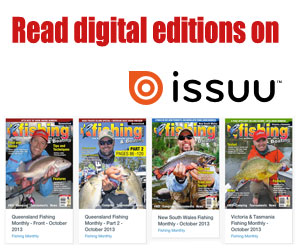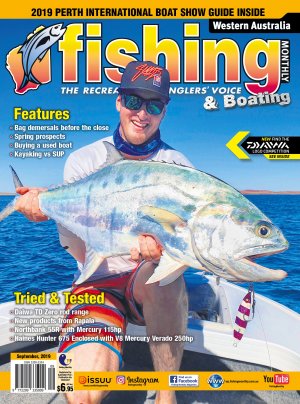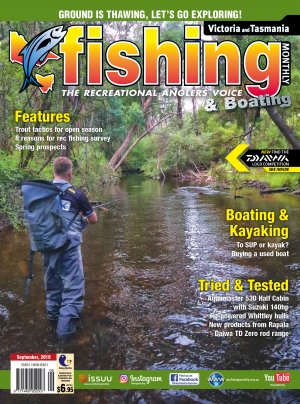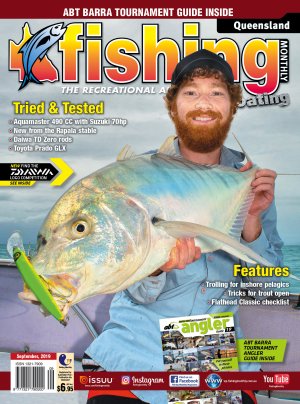Even though the days are getting shorter with the onset of winter, the up side is that the prime fishing times of dawn and dusk are getting closer together.
As in most forms of angling, dawn and dusk are when fish tend to be most active, which has definitely been the case in the surf in recent weeks. Bright sunny days aren’t conducive for all species to feed in the shore gutters, especially when the sun is high. And the westerly winds just exacerbate the fish’s sense of exposure by calming the surf considerably. So the winter weather and limited light can produce excellent catches.
Another factor that can lead to fish avoiding inshore gutters during the day is traffic noise. Although it seems that traffic on Noosa’s North Shore seems to have reduced significantly since the introduction of vehicle permits, it doesn’t take a lot of noise to spook some species. Weekends certainly seem to fish worse than on quieter weekdays and, to my way of thinking, that is to be expected.
As a youngster, my brother and I would often spearfish in the rocky gutters that were, at the time, always present in front of Teewah Village and mostly full of fish in the May school holidays. Bream, trag jew, tarwhine, flathead, crays and mud crab were the regular captures, along with an assortment of shells trapped amongst the coffee rock such as balers, volutes, nautilus, tuns and cowries that were all sought after.
Schools of big bream were common in these gutters but always tended to be out of range of the hand spear. Instead the fish just watched us and held fast to the steep edges of the gutter. We, on the other hand, were always watching them for any individual that strayed into range for an opportunistic shot. However, when the sound of a vehicle coming along the beach could be heard by the bream, they would all, much to our frustration, make an immediate beeline for the opening of the gutter to the sea. We would hear the car 10 seconds after the fish had, but the sound through the water of the approaching vehicle while still kilometres away, was very distinct and seemed to take forever before eventually it had passed and slowly began to recede into the distance. The bream sometimes moved back into the gutter after a little while, but if another car came along before they had, then rarely did they feel bold enough.
Ever since those wonderful carefree days of youth when fish were abundant, and crowds were not, the knowledge that fish are spooked by vehicle sounds is something that I am always conscious of. Many years later I also discovered that queenfish, tailor and mackerel can be spooked in mid feeding frenzy by a car door slamming on a quiet and calm Rainbow Beach. Particular care was always taken when sight fishing at Rainbow after that by parking well short of the target fish and approaching on foot – probably on tip toes if the truth be known.
Boat fishers would recognise that the same rules apply to dropping sinkers in the boat or banging the rod on the gunnel. Fish respond to these foreign noises and it is always wise to keep external sounds to a minimum.
First light during the week on Teewah Beach is generally traffic free until the Fraser Island tour buses come roaring north in convoy an hour or two after sunrise, with occasional vehicles through the day after that. Fishing before the traffic flow starts for the day is an optimum time. As the sun sets behind the coloured sand hills of Cooloola, traffic becomes less of an issue again and fish are more likely to be in the gutters.
Having said all of that, the news isn’t all bad for anglers that can only fish on weekends or during the day. It has been well recognised that fish can often adapt to foreign sounds in their environment and after a while stop fleeing from sounds that have never caused them or their mates a casualty. But there is one sound that the fish have adapted to that will always cause the fish to spook and to flee like there is no tomorrow – commercial netting.
On Teewah Beach, as is the case on so many of our beaches, the single greatest cause of mass mortalities of fish, is the commercial net. However, it is not the net that the fish hear and respond to, but the trapped fish within it that are all, in effect screaming to let their counterparts know of the danger that has once again presented itself. For a fish, commercial nets are the ultimate predator and over time, like any other animal, fish have learnt that they must be avoided at any cost.
The fish also have another trick up their sleeve when it comes to warning other fish in their locality of a present danger. Schreckstoff is a chemical that fish are known to discharge from their bodies when either physically damaged or when alarmed. In the case of netting, physical damage to the fish occurs as a result of abrasion from the net or due to being crushed under tonnes of their fellow victims as the net is hauled to the beach by 4wd’s or tractors. And just like any animal in a severely life threatening situation, fish urinate in fear and release schreckstoff in the process.
The spooking of fish by nets and subsequent area abandonment causes fish to feed, spawn and migrate in areas that are not optimum for their species’ survival. Diminished health of the fish as a result of less feeding, more swimming in avoiding netted areas and spawning in areas less conducive to maximum recruitment, eventually takes it toll on fish populations. This, in conjunction with overfishing by the commercial and recreational sector combined, causes populations to crash.
However, it has been demonstrated time and time again in locations where netting has been banned, such as in the Recreational Fishing Havens of New South Wales and recreational fishing allowed to continue, fish stocks always rebound. There can be no question as to the impacts that netting has on fish dynamics and populations and is the reason why measures such as RFH’s in Queensland are a must.
Queensland Fisheries are very supportive of the commercial sector and quite rightly so. There is an undeniable necessity for wild fish to be harvested and be supplied to the domestic market. However, what is unnecessary, is for every beach up and down our coastline to be netted. This simply causes the entire fishery to be over fished, fish populations to decline, non-viability for commercial fishers, recreational angling to be near pointless and ramifications to seabirds, dolphins and turtles to occur.
Until next month, happy fishing.
Reads: 3649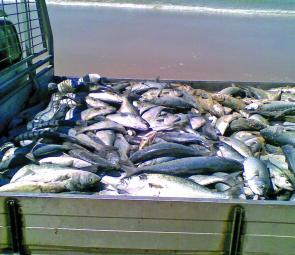
The greatest cause of mass mortalities of fish is the commercial net. Diminished health of the fish as a result of less feeding, more swimming to avoid netted areas and spawning in less conducive habitats to maximum recruitment, will eventually takes it t
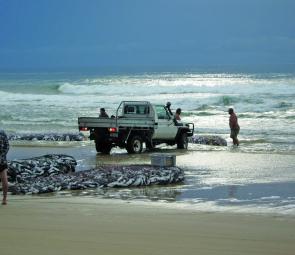
Overfishing by the commercial and recreational sectors causes fish populations to crash. There can be no question as to the negative impacts that netting has on fish dynamics and populations.

